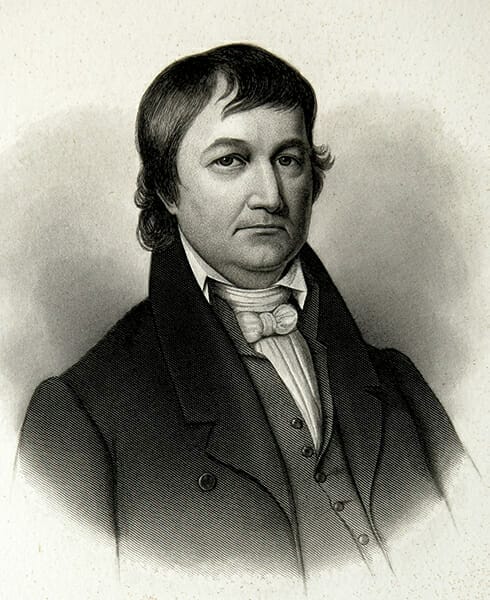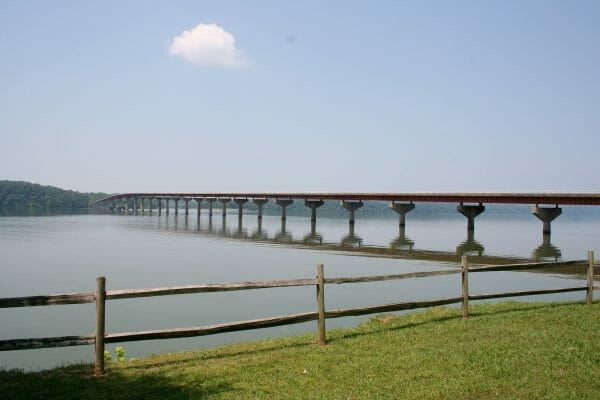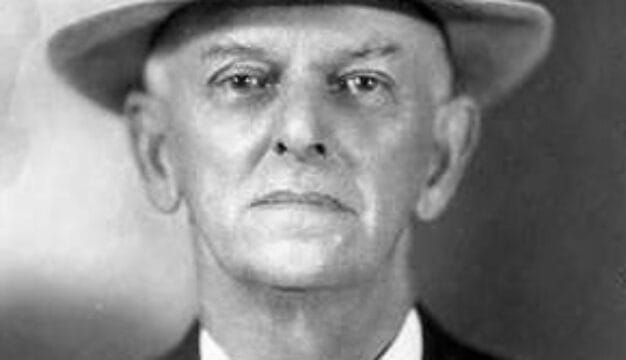John Coffee
 John Coffee
John Coffee (1772-1833) served with distinction under the command of Gen. Andrew Jackson during the War of 1812 in Alabama and Louisiana and was one of the principal founders of Florence, Lauderdale County. After the Battle of New Orleans in January 1815, Coffee settled in north Alabama, where he became a surveyor, land developer, and plantation owner. In March 1818, he joined other influential investors to form the Cypress Land Company and subsequently established the town of Florence at the foot of the Muscle Shoals on the Tennessee River.
John Coffee
John Coffee (1772-1833) served with distinction under the command of Gen. Andrew Jackson during the War of 1812 in Alabama and Louisiana and was one of the principal founders of Florence, Lauderdale County. After the Battle of New Orleans in January 1815, Coffee settled in north Alabama, where he became a surveyor, land developer, and plantation owner. In March 1818, he joined other influential investors to form the Cypress Land Company and subsequently established the town of Florence at the foot of the Muscle Shoals on the Tennessee River.
Coffee was born in Prince Edward County, Virginia, on June 2, 1772, to Lt. Joshua Coffee and Elizabeth Graves. In 1775, Joshua Coffee, a tobacco plantation owner, moved his family to North Carolina and later served in the Revolutionary War. Joshua Coffee died in September 1797; in his will, he left his son John five enslaved people, stipulating that they were to be sold to acquire land for him and his mother. Following these instructions, in 1798 John sold the people and moved with his mother to land he purchased along the Cumberland River near Nashville, Tennessee.
Not long after Coffee arrived in Tennessee, he met and befriended future U.S. president Andrew Jackson, with whom he formed a business partnership in 1804; John Hutchings, a nephew of Jackson’s wife, Rachel, was a third partner. The men opened a tavern and dry-goods store four miles from Jackson’s plantation, the Hermitage. The partners also invested in land in north Alabama. Coffee’s friendship with Jackson was further solidified by Coffee’s defense of Jackson in a duel fought with Nathaniel A. McNairy on March 1, 1806, in which Coffee sustained a slight wound. In 1807, Coffee was appointed as a surveyor of public lands on the Elk and Duck Rivers in Tennessee. He married Mary Donelson, the niece of Rachel Jackson, on October 3, 1809; they would have 10 children.
Shortly after the War of 1812 began, Coffee was commissioned as a colonel and formed the 2nd Regiment of Volunteer Mounted Riflemen, composed mostly of Tennessee militiamen with the exception of one company of volunteers from Madison County, Alabama. Coffee’s regiment joined Jackson’s forces in an expedition to Natchez in 1813 in anticipation of moving on to New Orleans. Once there, Jackson refused to turn his command over to Gen. James Wilkinson in New Orleans and instead marched the troops back to Nashville. Not long after their return, the news of the Fort Mims massacre in August 1813 resulted in the reactivation of the Tennessee militia to fight the Red Stick Creek uprising. Coffee was promoted to brigadier general in October and was given the command of a brigade consisting of approximately 1,300 cavalrymen that included his former 2nd Regiment of Volunteer Mounted Riflemen.
Coffee and his new brigade joined Jackson’s command in Alabama and thus participated in what would come to be known as the Creek War of 1813-14. From the hastily constructed Fort Strother on the Coosa River located about 30 miles south of present-day Gadsden, General Jackson dispatched troops to attack nearby Red Stick towns. On November 3, 1813, Coffee’s brigade won the first battle of the Creek War when his 900 mounted troops surrounded and destroyed the Creek town of Tallushatchee, 13 miles east of Fort Strother. Among the Creeks, 186 were killed in the battle, including a number of women and children. Coffee’s troops suffered only five dead and 41 wounded. Coffee’s victory convinced many other Creek towns to side with Jackson’s forces.
On November 9, 1813, Jackson’s army prevailed against Red Stick warriors who had surrounded the pro-American Creek town of Talladega. Although his forces, which included Coffee’s mounted troops, inflicted approximately 300 casualties on the Red Stick forces, a gap in the encirclement allowed 700 Red Sticks to escape. In January 1814, Coffee engaged many of these same warriors near Talladega in the Battle of Emuckfau Creek. Seriously wounded in this battle, Coffee convalesced for several weeks before rejoining Jackson in March 1814, just in time for the Battle of Horseshoe Bend that ended the Creek War. Coffee’s troops were deployed across the Tallapoosa River in the rear of the Creek encampment, denying the Red Sticks any possible path of escape in that direction.
After the Battle of Horseshoe Bend, Coffee returned to Nashville for a short while to recruit soldiers before joining Jackson in Mobile to prepare a defense against an expected British invasion. After participating in a brief raid on the British garrison at Pensacola, Coffee’s troops moved westward to Louisiana where, on December 23, 1814, he attacked British forces encamped at Villere’s Plantation, just 10 miles south of New Orleans. This attack temporarily halted the British advance, giving Jackson more time to set up his breastworks defending New Orleans. When British reinforcements arrived at Villere’s Plantation, Coffee’s mounted riflemen dropped back to cover Jackson’s left flank for the Americans’ decisive victory in the Battle of New Orleans, which occurred on January 8, 1815.
On October 4, 1815, Coffee was appointed by Pres. James Madison to survey the boundaries created by the Treaty of Fort Jackson, which had ended the Creek War. Coffee then settled in north Alabama and in March 1817 was appointed by Pres. James Monroe as surveyor general of the public lands. He first supervised the survey of public lands in the northern Mississippi Territory, which included what is now Alabama, and then of all of the lands
 John Coffee Memorial Bridge
within Alabama when it became its own territory. In March 1818, Coffee and his fellow investors of the Cypress Land Company purchased the land that became the town of Florence. Investors included Jackson, future Alabama governor Thomas Bibb, and future associate justice of the United States Supreme Court John McKinley. Ferdinand Sannoner, a young Italian engineer who had served with French Emperor Napoleon as a surveyor, laid out the new town under Coffee’s supervision. Also in 1818, Coffee purchased a plantation near Florence that he named Hickory Hill and moved his family there in 1819. That same year, Coffee was appointed to assist in the survey of the boundary lines separating Alabama, Mississippi, and Tennessee.
John Coffee Memorial Bridge
within Alabama when it became its own territory. In March 1818, Coffee and his fellow investors of the Cypress Land Company purchased the land that became the town of Florence. Investors included Jackson, future Alabama governor Thomas Bibb, and future associate justice of the United States Supreme Court John McKinley. Ferdinand Sannoner, a young Italian engineer who had served with French Emperor Napoleon as a surveyor, laid out the new town under Coffee’s supervision. Also in 1818, Coffee purchased a plantation near Florence that he named Hickory Hill and moved his family there in 1819. That same year, Coffee was appointed to assist in the survey of the boundary lines separating Alabama, Mississippi, and Tennessee.
Benefitting from his position as surveyor general, Coffee continued to invest in real estate, including a large tract purchased from the trustees of Cotton Port, located on the Tennessee River in Limestone County. During this time, the federal government appointed him to assist in negotiating several treaties with the Chickasaw and Cherokee nations in Alabama. As a result of these treaties, Coffee acquired large tracts of land for the United States, securing most of the Chickasaws’ lands east of the Mississippi River by 1832.
Coffee held the position of public surveyor in Alabama until his death on July 7, 1833, at the age of 61. He was buried in the Coffee family cemetery located on the grounds of Hickory Hill. The epitaph on his tombstone was written by Pres. Andrew Jackson.
Further Reading
- Dyas Collection, John Coffee Papers, 1770-1917 (Mf. 814). Tennessee State Library and Archives, Nashville, Tennessee.
- Fredriksen, John C. American Military Leaders: From Colonial Times to the Present. Santa Barbara, Calif.:ABC-CLIO, 1999.
- John Coffee Papers, SPR709, Alabama Department of Archives and History, Montgomery, Alabama.



